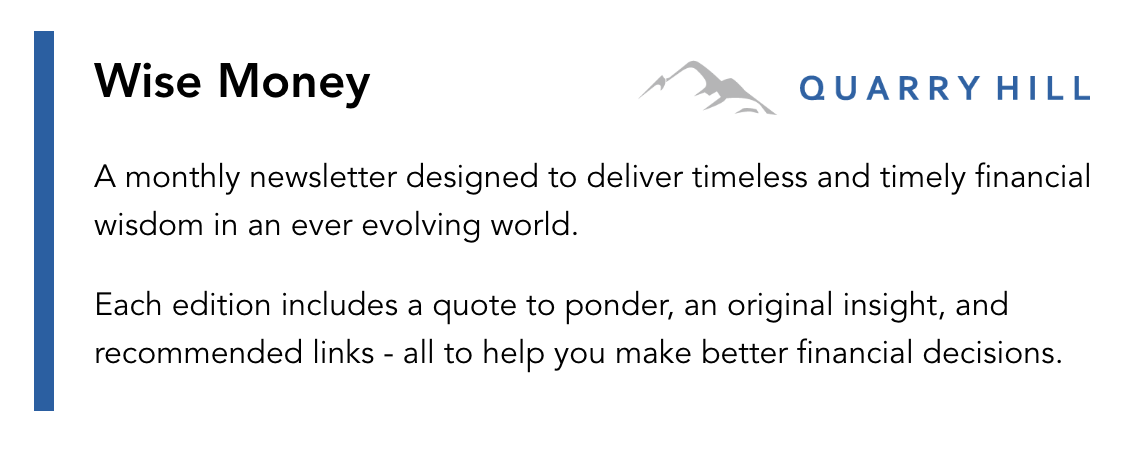

Quote to Ponder
"From dopamine’s point of view, having things is uninteresting. It’s only getting things that matter. If you live under a bridge, dopamine makes you want a tent. If you live in a tent, dopamine makes you want a house. If you live in the most expensive mansion in the world, dopamine makes you want a castle on the moon."
Recommended Links
- Avoid These 5 Common Financial Mistakes - NPR
- Six Rules for Traveling in Retirement - WSJ
- Has Your Email Been Compromised In a Data Breach?
- How to Check if You've Been Exposed in a Breach
- Humans Age Dramatically in Two Bursts -- age 44 and 60 - The Guardian
- What to Know Before Downsizing - WSJ
- Value Investing is Due for a Big Comeback - Financial Times
- The Billionaire vs. the Old Money - New York Magazine
Insight
Billionaires often spend their money in ways that baffle the rest of us. Take Justin Ishbia, for example. At just 46, with a net worth exceeding $5 billion, he’s engaged in a high-stakes battle with the residents of Winnetka, Illinois, to build a 68,000-square-foot mansion on Lake Michigan.
Why would someone with limitless resources choose to spend their time and money on something so contentious? The answer lies in the brain's reward system, particularly the role of dopamine.
Dopamine, often called the "molecule of more," plays a crucial role in how we experience pleasure and motivation. It’s released in our brains when we anticipate or achieve something rewarding. For most people, this might mean getting a promotion, buying a new car, or going on a dream vacation. But for billionaires like Ishbia, who can fulfill almost any desire instantly, the typical sources of satisfaction might not provide the same dopamine rush.
When you have everything, easily obtainable things lose their appeal. The drive to achieve something difficult, something that feels out of reach—even if it’s not—becomes more compelling. This is where dopamine comes into play.
The anticipation of overcoming a challenge, of winning a battle, triggers the release of dopamine. In Ishbia’s case, the challenge isn’t just building a massive mansion; it’s the battle with the local community, the resistance he faces, and the obstacles he must overcome. The mansion is less about luxury and more about the thrill of the fight.
Understanding how dopamine influences our desires can help us make better financial decisions. It’s not just about spending money; it’s about pursuing goals that reignite the spark of motivation. Mark Zuckerberg's secret compound in Hawaii, for instance, isn’t merely about creating a place to live; it’s about the pursuit of something that money alone can’t buy—a challenge, a conquest, a dopamine-driven reward.
This insight can also guide our personal financial choices. Take my situation: my current car is in great condition, and not buying a new one saves me a lot of money. But because I can afford a new car, I’m tempted to upgrade. This temptation isn’t just about the car; it’s about the excitement of something new, the thrill of the purchase.
By recognizing that this desire is driven by the pursuit of a dopamine rush rather than actual need, I can make a more rational decision. The money I’d spend on a new car could be better used elsewhere—perhaps saved or invested for future security, or spent on experiences that bring lasting happiness.
Understanding the role of dopamine can help us pause and reflect. Are we pursuing this because it’s something we truly need or want, or are we just chasing that next dopamine hit? By asking ourselves these questions, we can better manage our finances and make decisions that bring long-term satisfaction, rather than fleeting pleasure.
This material is intended for educational purposes only. You should always consult a financial, tax, or legal professional familiar with your unique circumstances before making any financial decisions. Nothing contained in the material constitutes a recommendation for purchase or sale of any security, investment advisory services or tax advice. The information and opinions expressed in the linked articles are from third parties, and while they are deemed reliable, we cannot guarantee their accuracy.
